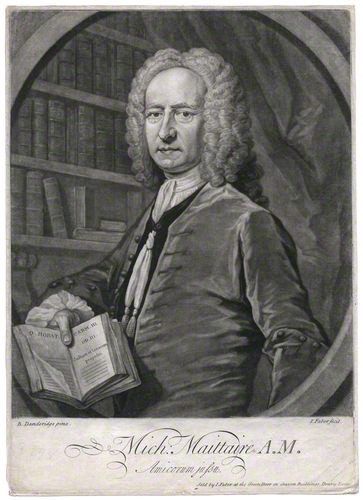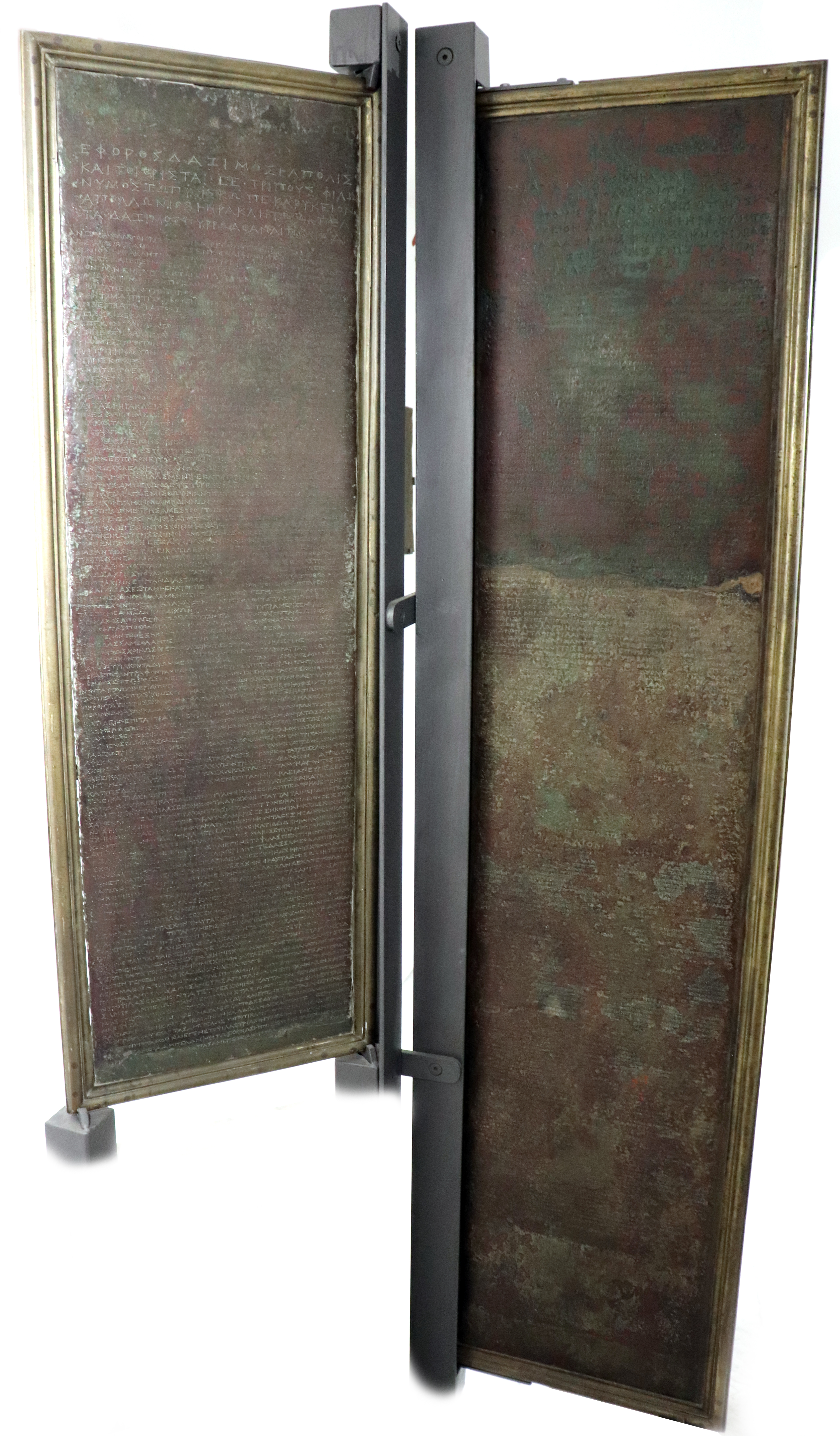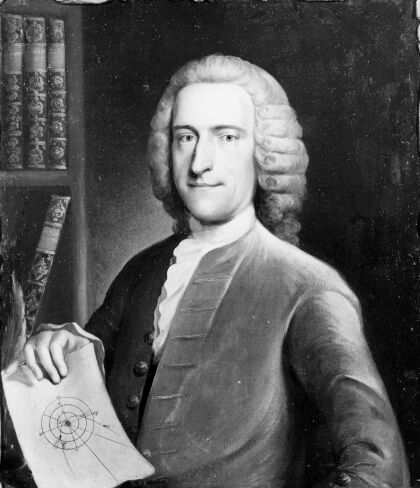|
Michael Maittaire
Michel Maittaire (also Michael) (1668 – 7 September 1747) was a French-born classical scholar and bibliographer in England, and a tutor to Lord Philip Stanhope. He edited an edition of Quintus Curtius Rufus, later owned by Thomas Jefferson. His works included a grammar of English (1712). Life He was born in France of Huguenot parents, who around the time of the Revocation of the Edict of Nantes moved to England. He obtained a king's scholarship at Westminster School in 1682. Richard Busby, then head-master, made him concentrate on the study of Greek and Latin. On leaving school he went to The Hague, where he was received by the Vaillants, and then to Paris. On returning to England he gained the goodwill of Robert South, at the time a canon of Christ Church, Oxford; it is said that he compiled a list of the Greek words that were wrongly accented in the works of William Sherlock. South made him 'canoneer' student of Christ Church, and he took the degree of M.A. on 23 March 1696, b ... [...More Info...] [...Related Items...] OR: [Wikipedia] [Google] [Baidu] |
Philip Stanhope, 4th Earl Of Chesterfield
Philip Dormer Stanhope, 4th Earl of Chesterfield, (22 September 169424 March 1773) was a British statesman, diplomat, and man of letters, and an acclaimed wit of his time. Early life He was born in London to Philip Stanhope, 3rd Earl of Chesterfield, and Lady Elizabeth Savile, and known as Lord Stanhope until the death of his father, in 1726. Following the death of his mother in 1708, Stanhope was raised mainly by his grandmother, the Marchioness of Halifax. Educated at Trinity Hall, Cambridge, he left just over a year into his studies, after focusing on languages and oration. He subsequently embarked on the Grand Tour of the Continent, to complete his education as a nobleman, by exposure to the cultural legacies of Classical antiquity and the Renaissance, and to become acquainted with his aristocratic counterparts and the polite society of Continental Europe. In the course of his post-graduate tour of Europe, the death of Queen Anne (r. 1702–1714) and the accession of ... [...More Info...] [...Related Items...] OR: [Wikipedia] [Google] [Baidu] |
Dunciad
''The Dunciad'' is a landmark, mock-heroic, narrative poem by Alexander Pope published in three different versions at different times from 1728 to 1743. The poem celebrates a goddess Dulness and the progress of her chosen agents as they bring decay, imbecility, and tastelessness to the Kingdom of Great Britain. Versions The first version – the "three-book" ''Dunciad'' – was published in 1728 anonymously. The second version, the ''Dunciad Variorum'', was published anonymously in 1729. The ''New Dunciad'', in a new fourth book conceived as a sequel to the previous three, appeared in 1742, and ''The Dunciad in Four Books'', a revised version of the original three books and a slightly revised version of the fourth book with revised commentary was published in 1743 with a new character, Bays, replacing Theobald as the "hero". Origins Pope told Joseph Spence (in ''Spence's Anecdotes'') that he had been working on a general satire of Dulness, with characters of contemporary Grub ... [...More Info...] [...Related Items...] OR: [Wikipedia] [Google] [Baidu] |
Heraclea Lucania
Heraclea, also Heracleia or Herakleia ( grc, Ἡράκλεια), was an ancient city of Magna Graecia. It was situated on the Gulf of Taranto between the rivers Aciris (modern Agri (river), Agri) and Siris (modern Sinni (river), Sinni). The ruins of the city are located in the modern ''comune'' of Policoro in the Province of Matera, Basilicata, Italy. History It was a ancient Greece, Greek colony, but founded at a period considerably later than most of the other Greek cities in this part of Italy. The territory in which it was established had previously belonged to the Ionians, Ionic colony of Siris (Magna Graecia), Siris, and after the fall of that city seems to have become the subject of contention between the neighboring states. The Athens, Athenians had a claim upon the territory of Siris, and it was probably in virtue of this that their colonists the Thurii, Thurians, almost immediately after their establishment in Italy, advanced similar pretensions. These were, however ... [...More Info...] [...Related Items...] OR: [Wikipedia] [Google] [Baidu] |
Tabulae Heracleenses
The Heraclean Tablets (in older texts, the ''Heraclean Table(s)''; Lat.''Tabulae Heracleenses'') are bronze tablets found a short distance from the site of Heraclea Lucania, in the direction of Metapontum. They are significant for the study of Roman Law. Background As a consequence of its having accepted Roman citizenship in 89 BCE, Heraclea became a municipium, and the ''Tabulae Heracleenses'' contain a long Latin inscription relating to the municipal regulations of Heraclea, which is a part of a copy of a more general law, the '' Lex Iulia Municipalis'', issued in 45 BCE for the regulation of the municipal institutions of towns throughout Italy. This document is a major authority for the municipal law of ancient Italy; it is engraved on two tablets of bronze, on the back of which is a long Greek inscription of earlier date, probably the 3rd century BC, defining the boundaries of lands belonging to various temples. History of the tablets The tablets were separate, and the major ... [...More Info...] [...Related Items...] OR: [Wikipedia] [Google] [Baidu] |
Thomas Rawlinson (bibliophile)
Thomas Rawlinson (1681–1725) was an English barrister, known as a bibliophile. Life Rawlinson was born in the Old Bailey in the parish of St. Sepulchre, London, on 25 March 1681, the eldest son of Sir Thomas Rawlinson (1647–1708), and his wife Mary Taylor (died 1725), eldest daughter of Richard Taylor of Turnham Green, Middlesex; Richard Rawlinson was a younger brother. After education under William Day at Cheam, and at Eton College under John Newborough, he matriculated at St John's College, Oxford on 25 February 1699. He left the university in 1701, and studied at the Middle Temple, where he had been entered on 7 January 1696. Rawlinson was called to the bar on 19 May 1705, and then made a tour through England and the Low Countries. Returning to London, he concentrated on municipal law, but succeeded to a large estate on the death of his father in 1708. He resided for some years in Gray's Inn, where his accumulation of books compelled him to sleep in a passage. In 171 ... [...More Info...] [...Related Items...] OR: [Wikipedia] [Google] [Baidu] |
Richard Mead
Richard is a male given name. It originates, via Old French, from Old Frankish and is a compound of the words descending from Proto-Germanic ''*rīk-'' 'ruler, leader, king' and ''*hardu-'' 'strong, brave, hardy', and it therefore means 'strong in rule'. Nicknames include "Richie", "Dick", "Dickon", " Dickie", "Rich", "Rick", "Rico", "Ricky", and more. Richard is a common English, German and French male name. It's also used in many more languages, particularly Germanic, such as Norwegian, Danish, Swedish, Icelandic, and Dutch, as well as other languages including Irish, Scottish, Welsh and Finnish. Richard is cognate with variants of the name in other European languages, such as the Swedish "Rickard", the Catalan "Ricard" and the Italian "Riccardo", among others (see comprehensive variant list below). People named Richard Multiple people with the same name * Richard Andersen (other) * Richard Anderson (other) * Richard Cartwright (other) * Ri ... [...More Info...] [...Related Items...] OR: [Wikipedia] [Google] [Baidu] |
Prince Eugene Of Savoy
Prince Eugene Francis of Savoy–Carignano, (18 October 1663 – 21 April 1736) better known as Prince Eugene, was a Generalfeldmarschall, field marshal in the army of the Holy Roman Empire and of the Austrian Habsburg dynasty during the 17th and 18th centuries. He was one of the most successful military commanders of his time, and rose to the highest offices of state at the Imperial court in Vienna. Born in Paris, Eugene was brought up in the court of King Louis XIV of France. Based on the custom that the youngest sons of noble families were destined for the priesthood, the Prince was initially prepared for a clergy, clerical career, but by the age of 19, he had determined on a military career. Based on his poor physique and bearing, and maybe due to a Affair of the Poisons, scandal involving his mother Olympe, he was rejected by Louis XIV for service in the French army. Eugene moved to Austria and transferred his loyalty to the Holy Roman Empire. In a career spanning six deca ... [...More Info...] [...Related Items...] OR: [Wikipedia] [Google] [Baidu] |
William Whiston
William Whiston (9 December 166722 August 1752) was an English theologian, historian, natural philosopher, and mathematician, a leading figure in the popularisation of the ideas of Isaac Newton. He is now probably best known for helping to instigate the Longitude Act in 1714 (and his attempts to win the rewards that it promised) and his important translations of the '' Antiquities of the Jews'' and other works by Josephus (which are still in print). He was a prominent exponent of Arianism and wrote ''A New Theory of the Earth''. Whiston succeeded his mentor Newton as Lucasian Professor of Mathematics at the University of Cambridge. In 1710 he lost the professorship and was expelled from the university as a result of his unorthodox religious views. Whiston rejected the notion of eternal torment in hellfire, which he viewed as absurd, cruel, and an insult to God. What especially pitted him against church authorities was his denial of the doctrine of the Trinity, which he believ ... [...More Info...] [...Related Items...] OR: [Wikipedia] [Google] [Baidu] |
Friedrich Wilhelm Sturz
Friedrich may refer to: Names * Friedrich (surname), people with the surname ''Friedrich'' * Friedrich (given name), people with the given name ''Friedrich'' Other * Friedrich (board game), a board game about Frederick the Great and the Seven Years' War * ''Friedrich'' (novel), a novel about anti-semitism written by Hans Peter Richter * Friedrich Air Conditioning, a company manufacturing air conditioning and purifying products *, a German cargo ship in service 1941-45 See also * Friedrichs (other) * Frederick (other) * Nikolaus Friedreich {{disambig ja:フリードリヒ ... [...More Info...] [...Related Items...] OR: [Wikipedia] [Google] [Baidu] |
Johan Frederik Reitz
{{disambiguation ...
Johan * Johan (given name) * ''Johan'' (film), a 1921 Swedish film directed by Mauritz Stiller * Johan (band), a Dutch pop-group ** ''Johan'' (album), a 1996 album by the group * Johan Peninsula, Ellesmere Island, Nunavut, Canada * Jo-Han, a manufacturer of plastic scale model kits See also * John (name) John (; ') is a common male given name in the English language of Hebrew origin. The name is the English form of ''Iohannes'' and ''Ioannes'', which are the Latin forms of the Greek name Ioannis (Ιωάννης), originally borne by Hellenized ... [...More Info...] [...Related Items...] OR: [Wikipedia] [Google] [Baidu] |
Thomas Knipe
Thomas may refer to: People * List of people with given name Thomas * Thomas (name) * Thomas (surname) * Saint Thomas (other) * Thomas Aquinas (1225–1274) Italian Dominican friar, philosopher, and Doctor of the Church * Thomas the Apostle * Thomas (bishop of the East Angles) (fl. 640s–650s), medieval Bishop of the East Angles * Thomas (Archdeacon of Barnstaple) (fl. 1203), Archdeacon of Barnstaple * Thomas, Count of Perche (1195–1217), Count of Perche * Thomas (bishop of Finland) (1248), first known Bishop of Finland * Thomas, Earl of Mar (1330–1377), 14th-century Earl, Aberdeen, Scotland Geography Places in the United States * Thomas, Illinois * Thomas, Indiana * Thomas, Oklahoma * Thomas, Oregon * Thomas, South Dakota * Thomas, Virginia * Thomas, Washington * Thomas, West Virginia * Thomas County (other) * Thomas Township (other) Elsewhere * Thomas Glacier (Greenland) Arts, entertainment, and media * ''Thomas'' (Burton novel) 1969 nove ... [...More Info...] [...Related Items...] OR: [Wikipedia] [Google] [Baidu] |
Bodleian Library
The Bodleian Library () is the main research library of the University of Oxford, and is one of the oldest libraries in Europe. It derives its name from its founder, Sir Thomas Bodley. With over 13 million printed items, it is the second-largest library in Britain after the British Library. Under the Legal Deposit Libraries Act 2003, it is one of six legal deposit libraries for works published in the United Kingdom, and under Irish law it is entitled to request a copy of each book published in the Republic of Ireland. Known to Oxford scholars as "Bodley" or "the Bod", it operates principally as a reference library and, in general, documents may not be removed from the reading rooms. In 2000, a number of libraries within the University of Oxford were brought together for administrative purposes under the aegis of what was initially known as Oxford University Library Services (OULS), and since 2010 as the Bodleian Libraries, of which the Bodleian Library is the largest comp ... [...More Info...] [...Related Items...] OR: [Wikipedia] [Google] [Baidu] |

.png)



